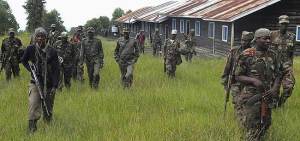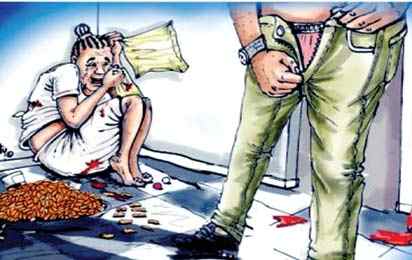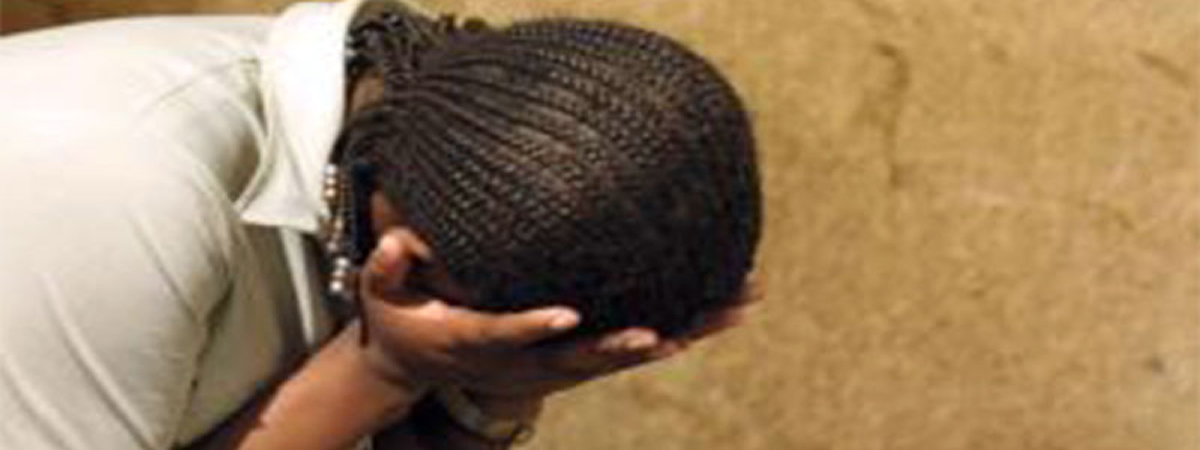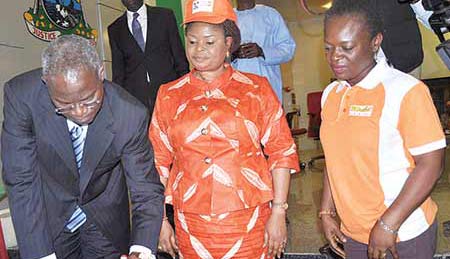DR Congo: M23 Rebels kill, rape civilians
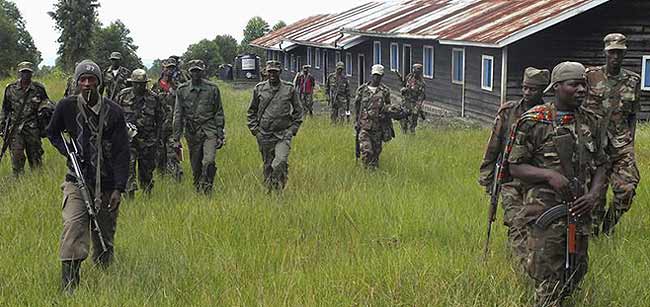
M23 rebels have summarily executed at least 44 people and raped at least 61 women and girls since March 2013 in eastern Democratic Repubilc of Congo. Local residents and rebel deserters reported recent forced recruitment of men and boys by the M23 in both Rwanda and Congo.
After a nearly two-month-long ceasefire, fighting resumed on July 14 between the Congolese armed forces and M23 rebels near the eastern city of Goma.
Residents and rebel deserters described recent support from within Rwanda to the abusive M23 forces. This includes regular movements from Rwanda into Congo of men in Rwandan army uniforms, and the provision of ammunition, food, and other supplies from Rwanda to the M23. The M23 has been recruiting inside Rwanda. Rwandan military officers have trained new M23 recruits, and have communicated and met with M23 leaders on several occasions.
“Not only is Rwanda allowing its territory to be used by the abusive M23 to get recruits and equipment, but the Rwandan military is still directly supporting the M23,” said Daniel Bekele, Africa director at Human Rights Watch. “This support is sustaining an armed group responsible for numerous killings, rapes and other serious abuses.”
The latest Human Rights Watch findings are based on more than 100 interviews since March, including with former M23 fighters who left the movement between late March and July and civilians living near the Congo-Rwanda border, some of whom were victims of abuses.
In addition to M23 abuses, Human Rights Watch documented several cases of killings and rapes by Congolese Hutu militia groups operating in and around M23-controlled territory. Some Congolese army officers have allegedly supported factions of these groups, as well as factions of the allied Democratic Forces for the Liberation of Rwanda (FDLR) – a largely Rwandan Hutu armed group, some of whose members participated in the 1994 genocide in Rwanda.
Since its inception in April 2012, the M23 has committed widespread violations of the laws of war. Despite numerous war crimes by M23 fighters, the armed group has received significant support from Rwandan militaryofficials. After briefly occupying Goma in November, then withdrawing on December 1, the M23 controls much of Congo’s Rutshuru and Nyiragongo territories, bordering Rwanda.
On April 25 and 26, M23 fighters killed 15 ethnic Hutu civilians in several villages in Busanza groupement in Rutshuru territory, and at least another 6 in mid-June, in an apparent attempt to “punish” villagers for alleged collaboration with Congolese Hutu militias.
Other civilians killed by M23 fighters since March include a 62-year-old man who was shot dead because he refused to hand his sons over to the M23, a motorcycle driver who refused to give money to the M23, M23 recruits who were caught after trying to escape, and others accused of collaborating with Hutu militia.
On July 5, four M23 fighters gang-raped a 12-year-old girl as she went to fetch water in her village in Rutshuru. An M23 fighter who accosted an 18-year-old woman near Bunagana shot her in the leg on April 15 when she refused to have sex with him.
Since June, M23 leaders have forced local chiefs in areas under their control to undergo military and ideological training and obtain recruits for the M23. The M23 considers these chiefs to be part of their “reserve force” that can be called upon to provide support during military operations.
M23 fighters have arrested or abducted dozens of civilians in recent weeks in Rutshuru, most of them Hutu. The M23 accused many of them of collaborating with the FDLR or allied Congolese Hutu militias. M23 fighters beat them severely, tied them up, and detained them. The M23 then forced many of them to undergo military training and become M23 fighters.
A former M23 police officer, who deserted in April, told Human Rights Watch that he participated in investigations of killings of civilians. He said that before each investigation, a high-ranking M23 commander, Innocent Kayna, told him: “You will do the investigation. You will say it’s bandits in the neighborhood who killed, not M23.”
Human Rights Watch contacted the M23’s military leader, Sultani Makenga, but he was unavailable to speak about the recent alleged abuses.
Those recruited in Rwanda into the M23 include demobilized Rwandan army soldiers and former FDLR fighters, most of whom had become part of the Rwandan army’s Reserve Force, as well as Rwandan civilians. A 15-year-old Rwandan boy told Human Rights Watch that he and three other young men and boys were promised jobs as cow herders in Congo, but when they got to Congo were forced to join the M23. They were given military training by Rwandan officers in Congo and told they would be killed if they tried to escape. Other M23 deserters also said Rwandan officers were training new M23 recruits.
Former M23 officers who had been part of previous Rwanda-backed rebellions said they recognized officers serving with the M23 who they knew were members of the Rwandan army. Congolese deserters told Human Rights Watch that a number of M23 fighters admitted freely that they were Rwandan. Some said they had served in the Rwandan army’s peacekeeping contingent in Darfur.
Recent M23 deserters interviewed by Human Rights Watch described frequent – in some cases weekly – arrivals of soldiers and recruits from Rwanda. Sometimes these were rotations, with new soldiers replacing others who had returned to Rwanda. Weapons, ammunition, large containers of milk, truckloads of rice, and other supplies were brought to the M23 from Rwanda. M23 deserters also described phone conversations and meetings in both Rwanda and Congo between senior M23 leaders and people the deserters were told or knew to be Rwandan officials.
All of the recent M23 deserters interviewed by Human Rights Watch said that Rwandan soldiers, officers, and trainers were present throughout their time with the M23, and that there had been new arrivals from Rwanda in recent months.
“For the past 17 years, the Rwandan army has repeatedly deployed troops to eastern Congo and backed abusive proxy forces responsible for war crimes,” Bekele said. “As in the past, Rwanda denies it’s supporting the M23, but the facts on the ground speak for themselves.”
Rwandan government and military officials did not respond to Human Rights Watch’s requests for a meeting. Rwandan officials in the past have repeatedly denied allegations that the government is providing support to the M23.
The Rwandan government should immediately halt all support to the M23 because of its broadly abusive behavior, Human Rights Watch said. The United Nations and United States special envoys for the Great Lakes region and donor governments should publicly denounce continuing Rwandan support to the M23 and call for sanctions against senior Rwandan officials responsible for backing the armed group.
The Congolese government should immediately suspend, investigate, and prosecute as appropriate Congolese military officers and government officials who have provided support to the FDLR or allied groups. The government should make clear that abusive militia commanders will not be integrated into Congo’s army as part of any political settlement.
According to international journalists present near the front line and photographs seen by Human Rights Watch, Congolese army soldiers treated the corpses of M23 fighters killed in combat on July 16 in a degrading manner, stripping them, making ethnic slurs, and prodding their genitals with weapons. International law prohibits “committing outrages upon personal dignity,” including against the dead. Human Rights Watch also documented cases in which the Congolese army detained former M23 fighters and alleged collaborators for several weeks without bringing them before a court, and often incommunicado and in harsh conditions.
Congolese military officials should appropriately discipline officers and soldiers responsible for mistreating corpses, and ensure that such acts cease immediately. Military and judicial officials should ensure that captured combatants and civilians are treated in accordance with due process standards, including being promptly brought before a judge and charged, or released. Detainees should not be mistreated or held in inhumane conditions.
Summary Executions and Other Attacks by the M23
Human Rights Watch has documented 44 summary executions committed by the M23 since March. M23 fighters have also killed and wounded an unknown number of civilians, including some caught in the crossfire during fighting.
M23 fighters killed 15 Hutu civilians in several villages in Busanza groupement in Rutshuru territory on April 25 and 26, and at least another 6 in mid-June, in an apparent attempt to “punish” villagers for alleged collaboration with Congolese Hutu militias.During the attack on the night of April 25, a group of M23 fighters moved through the villages of Ruvumbura, Kirambo, Nyamagana, and Shinda, killing and looting as they went. A 43-year-old mother of three told Human Rights Watch: “When they started killing people, we scattered into the bush. My husband went back to try to get our belongings, and they killed him. They shot him in the head.”
In late May, M23 fighters shot dead a 62-year-old man in Ntamugenga because he refused to hand his sons over to the M23. On May 15, M23 fighters stopped a motorcycle driver outside Kiwanja and killed him because he did not give them money. In mid-June, M23 fighters shot a moneychanger several times in the chest, killing him. They then told his wife, “Give us money or we’ll do to you what we did to your husband.” She handed over their money, and the fighters left.
In Kibumba in mid-May, an M23 officer, Col. Yusuf Mboneza, ordered the execution of a 24-year-old man whom he accused of being a thief. After the execution, Mboneza called the villagers to a meeting and displayed the young man’s corpse, saying it should serve as a warning to anyone else who might steal.
Others summarily executed by the M23 since March were new recruits and prisoners who unsuccessfully tried to escape.
On June 21, the M23 caught a Congolese M23 fighter known as “Tupac” as he tried to flee near Kabuhanga. They took him back to the military camp at Kamahoro, where the commander ordered the troops into formation and told soldiers to shoot him to discourage other deserters. They shot Tupac twice in the chest at close range. An M23 deserter told Human Rights Watch that he and other recruits were forced to bury Tupac.
After a clash between the M23 and a Congolese Hutu militia group on June 18, M23 fighters looted several villages in Busanza. The fighters demanded money from a 33-year-old woman. When she said she had no money, the fighters cut her on the shoulder with a machete and struck her 11-year-old son on the head. On April 15, an 18-year-old woman was shot in the leg when she refused to have sex with an M23 fighter who approached her at her farm near Bunagana. The victims of these attacks survived with serious injuries.
Rape by the M23
Human Rights Watch has documented 61 cases of rape of women and girls by M23 fighters between March and early July. Because of the stigma surrounding rape and fear of reprisals, the actual number of victims may be much higher. Many of those raped were in their fields or collecting firewood. M23 fighters accused some of them of being the “wives” of FDLR fighters. Most of the rapes occurred close to M23 positions, and some victims recognized the attackers as M23 fighters they had seen before. The rapists frequently told their victims that they would be killed if they spoke about the rape or sought medical treatment.
A 12-year-old girl told Human Rights Watch that an M23 fighter caught and raped her in June as she and her friends were buying sugar cane in a field near an M23 position in Rutshuru:
I saw a [M23] soldier. I started running, but I tripped on a piece of sugar cane and fell. The soldier caught up with me and said he would kill me because I tried to flee. I stopped then because I was very scared. Then he raped me. I cried out, but he closed my mouth.
A 17-year-old girl said M23 fighters had raped her twice. The second time, in June, occurred when she was alone in her house after M23 police abducted her husband and forced him to join a night patrol:
The M23 fighter came into my house and asked me where my husband was. He then put a knife to my chest and said he was going to kill me, and that I should give him money. I told him I didn’t have any money, that my husband took it with him on patrol. I was sitting on the bed with my child. The soldier fought with me on the bed. He was stronger than me and he had a gun. Then he raped me.
A 35-year-old Hutu woman who was raped by an M23 fighter near Bunagana in June told Human Rights Watch:
When he finished, he left me in the forest. I was shaking and turned toward the ground, crying.… The one who raped me was an M23 fighter whom I know. I recognized him, but what can I do to him?
Forced Recruitment, Including of Children, and Abductions by the M23
Human Rights Watch has documented dozens of cases of forced recruitment by M23 forces since March, including of children. Recruitment appears to have increased in recent months as the M23 has struggled to keep its forces’ numbers up. Over 700 M23 fighters and political cadres fled to Rwanda when Bosco Ntaganda’s faction of the M23 was defeated by an M23 faction led by Makenga in March, an estimated 200 M23 fighters were killed during the infighting, and scores of fighters have deserted.
Since June, the M23 leadership has held several meetings with local chiefs and other community leaders and demanded their help in recruiting new fighters. In early June, the M23 forced local leaders and chiefs to attend a week-long military training conducted by Rwandan officers. They also received “ideological training,” which included the M23’s vision for taking over Congo.
The chiefs were released but are supposed to form part of a “reserve force” that can be called upon when necessary. The M23 ordered them to find recruits in their villages and send them to the M23. One local leader who participated in the training told Human Rights Watch that they had been told to give M23 officials the names of demobilized youth in their villages, so that the M23 “could then go themselves, find the demobilized youth, and make sure they joined up.”
The M23 have arrested Hutu civilians whom they accused of collaborating with or supporting the FDLR or Congolese Hutu militia groups. The fighters detained, beat and whipped these civilians, and took many of them to an M23 military camp, where they were trained and forced to become M23 fighters.
A 19-year-old secondary school student told Human Rights Watch that he was recruited by the M23 in March while he was farming near Kalengera, in Rutshuru:
I saw the M23 come and surround me. They asked me if I was an FDLR, and I said no. After that, they started whipping and beating me. They tied me up and took me to Rumangabo, where they locked me in a cell. After two days, they untied me, but left me in the cell for a week. After, they told me I would become a soldier. They then started the military training. There were 80 of us being trained. There were 10 officers from Rwanda who led the training. They told us we had to become soldiers so we could fight to liberate Goma and then continue on to South Kivu.
On June 3, the M23 went from house to house in Kiwanja’s Kachemu neighborhood, apprehending about 40 young men and boys whom they accused of collaborating with a local militia group. The fighters beat the civilians and detained them in a cell at the M23’s base in Nyongera. Many had difficulty walking the next day as a result of the ill-treatment. About half of the youth were released after their families paid the M23 guards; 20 were taken to Rumangabo to be trained as fighters.
In other cases, families do not know what happened to abducted relatives. In March and April, for example, M23 fighters in Busanza abducted four young men whom they accused of collaborating with a Congolese Hutu militia. Their families have not heard from them since.
Congolese army soldiers captured by M23 fighters described torture and other ill-treatment in detention. One soldier, who was taken by the M23 in December and escaped in early July, said that two other soldiers held prisoner with him were beaten to death. For three days, the rebels hit the prisoners with sticks and stomped on their chests, while their legs and arms were tied together. While beating them, the M23 demanded information about where the Congolese army was hiding its weapons. The two men were not given medical treatment and died in detention.
Source: HRM: http://www.hrw.org/news/2013/07/22/dr-congo-m23-rebels-kill-rape-civilians
